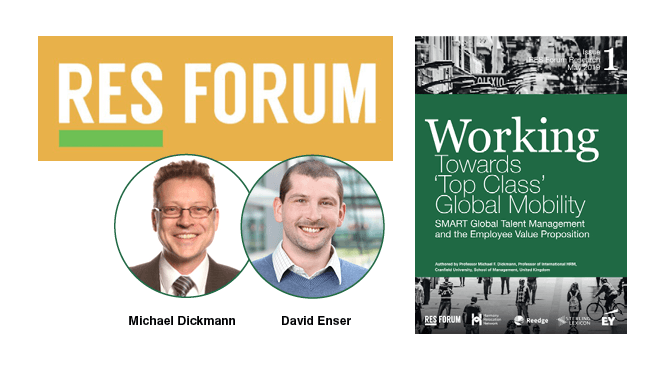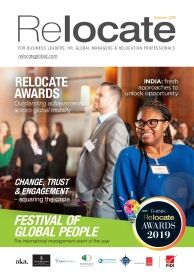The challenges of recruiting globally mobile employees
Global work is crucial for employer and employee, so why is there such a critical shortage of employees who are willing to be globally mobile – and what can employers do about it? What is the impact of global work on future career outcomes?

How important is global work for employees' career outcomes?
Global work experience increases in importance with seniority. In the last two decades, we have heard that working abroad has a positive influence on staff careers. But how important is it for career progression and are there diverse patterns among different staff categories?The survey answers showed that in 71% of organisations it was ‘very’ or ‘extremely’ important for executive managers to be globally mobile. In more than half of multinational corporations (MNCs) (56%), this was the case for senior managers, while in more than a third of firms (36%) it was ‘highly’ important for managers. In marked contrast, it was ‘not at all’ or ‘only slightly’ important for about half of professionals or entry-level professionals. Only in about a quarter of companies was it ‘highly’ important for their staff career advancement to have global work experience. Thus, it is still the case that the more employees aspire to reach senior management positions the more important international opportunities will be for them. Given the growing prevalence of Millennials in organisations and their stronger push to want to work abroad, as well as the current shortage in workers willing to move abroad, this may increase dramatically in the coming years.‘Key decider’ roles increasingly need global insights. For two-thirds of executive managers (68%) and half of senior managers (52%), it is ‘highly’ important to have had international assignment experience prior to being promoted to a senior leadership role. This percentage decreases dramatically at lower levels of seniority, with only one in five (17%) managers and one in 30 (3%) professionals needing global work experience before being promoted. While these are the requirements for promotion in diverse companies, what does this mean for the general career advancement patterns after working abroad?Global work results in better career progression, especially for career development and knowledge assignments. The survey evaluated the career progression of repatriates by comparing their careers to their peers who have not worked abroad. The good news is that only in very few cases do the careers of repatriates (provided they stay with the organisation) turn out to be worse than those of their non-expatriated peers.While in some organisations the career impact of people with and without global work experience is similar – especially for those on position filling (47%) and control and coordination (35%) assignments – there are many repatriates whose careers benefit from working abroad. Even though many respondents were unsure about career development (about a third), one in two repatriates on career development assignments and one in three (38%) on knowledge acquisition/transfer assignments experienced a career that is better than that of non-expatriated peers.In addition, one in five repatriates on other types of international work gained career benefits when compared to peers who have never worked abroad. The better career progression of repatriates is a strong argument for GM departments to demonstrate the attractiveness of working abroad.What is the impact of international assignments on future career outcomes?
Remuneration, promotion and performance are often good in the first year after return. MNCs could improve their GM insights into the effects of working abroad. Between a third and half of companies do not distinguish/ track important HR data of repatriates. While the number of firms that know whether repatriates had left the organisation in the first year after return was comparatively high, a surprising 31% did not have this data.Of those who provided data, we collated the answers to ‘sometimes’, ‘mostly’ and ‘always’; 61% of organisations experienced repatriate churn (staff turnover of repatriates) in the first year, 80% of MNCs saw repatriates ‘sometimes’ or more frequently promoted, 86% had many repatriates who received higher performance ratings and 74% had frequent instances of faster compensation increases in comparison to non-expatriated peers. While many employees frequently change employer when seeking new challenges or other opportunities, the propensity of repatriates who leave their organisation is still higher compared with their non-expatriated peers in many firms.Overall, we can observe some positive trends in the last ten years in this area. It seems that the ‘career wobble’ and problems during the first year after return do exist, but companies have learned how to better manage these over the last decade.Excellent HR data on performance, careers and rewards endures over the long term. Only one in three repatriates (31%) ‘always’ or ‘mostly’ changed their employer in the first five years after return, which is an encouraging statistic. Adding in the ‘sometimes’ category, 85% of the responding organisations’ repatriates were promoted faster, in 78% of cases they had higher performance ratings, in 84% they experienced faster compensation increases, in 76% they went more often on another international assignment and in 82% of cases they had better opportunities to work on special projects.Women repatriates experience slightly worse HR outcomes. The survey also explored the differences in short- and long- term outcomes experienced by repatriates between men and women. Again, the overall trend was highly positive for both genders. In comparison, two areas stood out where women’s outcomes were more positive for the organisations: repatriate churn (in the first year and within five years) and performance in the first year after return.For the other HR indicators, the respondents documented that more men gained higher rewards, performance ratings and promotions. However, the differences were statistically small, with the biggest not being very pronounced (11% of respondents indicated that fewer women than their overall populations would have better opportunities to work on special projects and 9% fewer getting promoted faster in the first five years). Nevertheless, these are areas of possible concern in which a GM department could explore whether there is institutional bias or discrimination. It would certainly be interesting to evaluate whether organisations’ global EVPs can more positively take account of women’s differing interests, situations, global experiences and outcomes to make working abroad more attractive.Conclusions
Employers need people who are willing to work abroad and international experience is particularly important for the most senior positions of the organisations surveyed.Conversely, employees need international experience, both to enhance their future career prospects and to meet their own personal goals. Yet the organisations surveyed have a large shortage of employees who are willing to be internationally mobile.More than half of the companies have at least a 20% gap in their requirements (for entry-level professionals) and a shortage of more than two-thirds for professionals, managers and senior managers. MNCs encounter the biggest challenge at the executive manager level, where three-quarters have at least a 20% gap and more than half have a 40% gap.Urgent action to increase the attractiveness of global work is needed and a strong GTM approach that fulfils the many objectives and talent/ succession demands that organisations have. Once a GTM approach and an associated comprehensive EVP concept have been defined, it should be communicated and its outcomes assessed as a matter of course. Through this approach, GTM and the attractiveness of working abroad can be refined, strengthening the global competitive position of the organisation.This article is based on content from the May 2019 RES Forum research paper, ‘Working towards Top-Class Global Mobility - Smart Global Talent Manageme://theresforumMichael Dickmann is professor of International HRM at Cranfield University School of Management and strategic adviser to the RES Forum. David Enser is partner and head of Cross-Border Employment and Reward Innovation at the RES Forum.Subscribe to Relocate Extra, our monthly newsletter, to get all the latest international assignments and global mobility news.Relocate’s Global Mobility Toolkit provides free information, practical advice and support for HR, global mobility managers and global teams operating overseas.
 Access hundreds of global services and suppliers in our Online Directory
Access hundreds of global services and suppliers in our Online Directory ©2019. This article first appeared in the Summer 2019 edition of Relocate magazine, published by Profile Locations, Spray Hill, Hastings Road, Lamberhurst, Kent TN3 8JB. All rights reserved. This publication (or any part thereof) may not be reproduced in any form without the prior written permission of Profile Locations. Profile Locations accepts no liability for the accuracy of the contents or any opinions expressed herein.
©2019. This article first appeared in the Summer 2019 edition of Relocate magazine, published by Profile Locations, Spray Hill, Hastings Road, Lamberhurst, Kent TN3 8JB. All rights reserved. This publication (or any part thereof) may not be reproduced in any form without the prior written permission of Profile Locations. Profile Locations accepts no liability for the accuracy of the contents or any opinions expressed herein.























